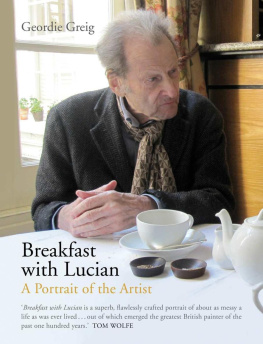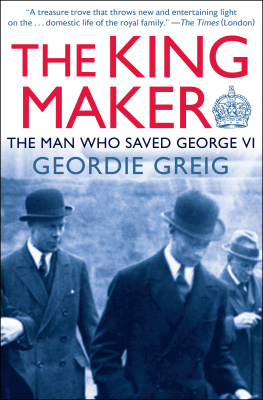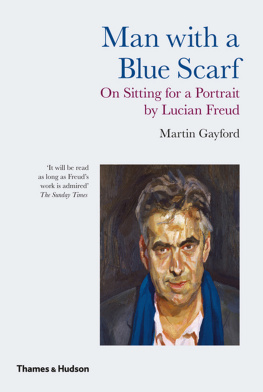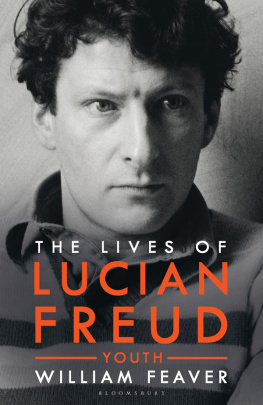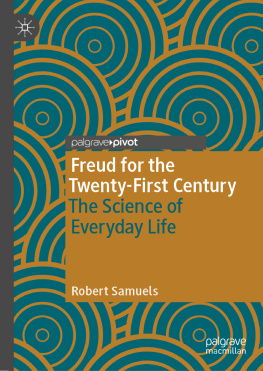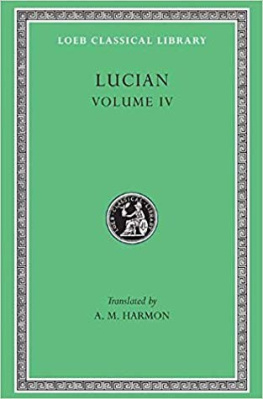Breakfast with Lucian Greig, GeordieRandom House (2013)
Contents
About the Book
For ten years Geordie Greig was among a very small group of friends who regularly met Lucian Freud for breakfast at Clarkes restaurant on Kensington Church Street. Over tea and the morning papers, Freud would recount stories of his past and discuss art. It was, in effect, Freuds private salon.
In this kaleidoscopic memoir, Greig remembers Freuds stories: of death threats; escaping from Nazi Germany; falling out with his brother Clement; loathing his mother; painting David Hockney; sleeping with horses; escaping the Krays; painting the Queen; his controversial role as a father; and why Velzquez was the greatest painter. It is revelatory about his art, his lovers, his children, his enemies and his love of gambling. Freud dared never to do dull, speaking candidly of dancing with Garbo as well as painting Kate Moss naked.
Those closest to him, after decades of silence and secrecy, have spoken frankly about what life was like living, loving or sitting for the greatest figurative portraitist of the twentieth century. Partly based on hours of taped conversations with the artist and his circle, and drawing on interviews with those who knew Freud intimately including many girlfriends, models, dealers and bookmakers Breakfast with Lucian is an intimate portrait of the artist as a young and old man. Illustrated with many unseen photographs of Freud, it is a uniquely fascinating, personal and authoritative account of one of the greatest British painters of this century and the last, and a profile of a man who makes everyone elses life seem less lived.
About the Author
Geordie Greig is the Editor of the Mail on Sunday . He was previously the Editor of the London Evening Standard and Editor of Tatler . He lives in London and is married to a Texan with whom he has three children. His last book was The Kingmaker , the story of his grandfathers friendship with King George VI.
For Kathryn, Jasper, Monica and Octavia
What matter? Out of cavern comes a voice,
And all it knows is that one word Rejoice!
Conduct and work grow coarse, and coarse the soul,
What matter? Those that Rocky Face holds dear,
Lovers of horses and of women, shall,
From marble of a broken sepulchre,
Or dark betwixt the polecat and the owl,
Or any rich, dark nothing disinter
The workman, noble and saint, and all things run
On that unfashionable gyre again.The Gyres, W. B. YeatsDull not to.H. L. C. Greig (19252012)
Preface
In the mid 1990s Lucian Freud stopped publication of his authorised biography. Even though he had cooperated with the writer he paid him off with a substantial sum. When Lucian read the manuscript he was appalled that so many intimate details would enter the public domain. The idea that the book would be published in his lifetime was abandoned.
When I was a news reporter on the Sunday Times in the late 1980s, another writer told me that East End gangsters had come round to his house, at Freuds request, and threatened him with unpleasant consequences if he did not stop researching a biography. That book withered too.
This book avoided his obstructions. We met for breakfast regularly over the last ten years of his life, and during our many conversations Lucian gradually opened up. Eventually he was happy for me to record what we said. We had an understanding that it was fine for me to publish what he told me in different magazines and newspapers. The resulting book, started after Lucians death, is a personal perspective on his life and work by someone who followed his career for thirty-five years but only gained his confidence and trust in his last decade.

Walking home with David Dawson, 2011
CHAPTER ONE Breakfast
Scruffy, slightly stooped and silent, the two men looked like characters arriving for a dress rehearsal of Waiting for Godot . Breakfast with Lucian invariably began the same way, with the Grand Old Man of British art and his younger assistant, David Dawson, walking the few doors down from the painters home in Kensington Church Street in Notting Hill to Clarkes restaurant. Lucian often wore a paint-flecked, grey cashmere overcoat, and black lace-up workmens boots, which gave him a sartorial edginess. The coat was from Issey Miyake, and his unironed white shirt was crumpled but expensive.
Lucian entered Clarkes before the curtain went up. He and David would slip through the delicatessen next door to the restaurant, via a side passage into the empty dining room. The shop does a brisk trade in almond croissants, pains au chocolat, organic cheeses, quiches, lemon tarts, sausage rolls and breads, but breakfast next door was a privilege that Sally Clarke the eponymous owner of the restaurant and one of Lucians last sitters only ever granted to him. In effect, it became Lucians private salon for himself and his guests.
It is a small upmarket restaurant that has been a fixture in Kensington for more than a quarter of a century. Its customers often remarked that it felt more like going to a dinner party than a restaurant, as for most of that time Sally Clarke offered no menu choice, only what she had decided to cook that day. It has relaxed that distinction in recent years to give a choice of three or four dishes every day, always what is freshest on the market. It is a discreet and popular venue for top brass from the BBC, and people like Bryan Ferry, Salman Rushdie and Dame Maggie Smith. When the Burmese opposition leader Aung San Suu Kyi came to the UK in June 2012 after a twenty-four-year exile, it was where she spent her one lunch in London, on her sixty-seventh birthday. Cashmered English ladies of a certain age enjoy its quiet atmosphere. A card on the table indicates that mobile phones are forbidden. The Duke and Duchess of Cambridge are customers. It is situated among estate agents and specialist antique shops, and is easily missable; but once through its wood and glass doors, its superiority over almost every other restaurant in the area is evident.
Lucian had first started going to the tiny front caf in Clarkes in 1989 with Leigh Bowery, the flamboyant Australian performance artist whose pierced cheeks and blond wig or bald pate made Lucian fade into anonymity beside him. He became a sitter for Lucian and was paid to pose naked. Lucian loved the starched white tablecloths, the pretty girls in their chefs uniforms, the light airy atmosphere and bright arrangements of flowers on the bar counter, the delicious food and, of course, his friendship with Sally. His shabby-chic style and hint of dishevelment masked a man of discernment and taste. Nothing was unplanned. Breakfast at Clarkes was precious downtime for him. He had a never-ending work schedule, a round-the-clock regime, or round the cock, as one wag put it, since his libido never appeared to fade. Occasionally, he would mock-grab the thigh of one of his female guests, or the waitresses, or Sally, who would laugh. Somehow he carried off a gesture that might have seemed boorish or ill-judged in others. It was meant playfully, almost comically, and came with affection, originating from an era before political correctness. It was also evidence of a man who grabbed life; there were no rules, certainly not in playfulness. He was the man who got away with everything. But then, as his grandfather Sigmund once said, there is no such thing as a joke.
Lucian and David walked to Clarkes for breakfast most days, and for almost ten years, on and off, usually on Saturdays, I was part of a small cast of invited friends, although we were kept separate. He juggled past lovers and new ones, art dealers, his children, framers and friends. The range was wide: from a beautiful girl dying of cancer who worked for the Queen to a former heroin addict who had been to jail, his wine merchant, favourite auctioneer, bookmaker or the painter Frank Auerbach, his oldest friend. Freud was a great divider. He allowed few of us to see any of the others. The central crossroads in his later life were his painting studio and Clarkes. Everyone important to him in his final years met there.
Next page
